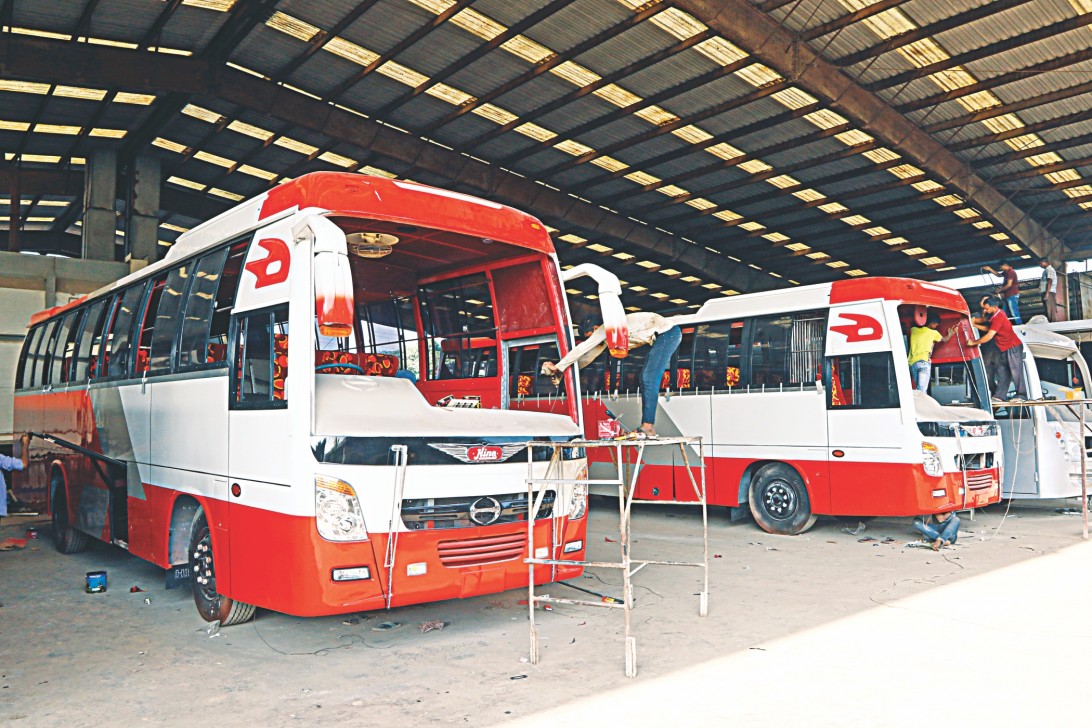Bus-truck body builders flex muscles

Just 20 years ago, it was beyond imagination that bodies of buses and trucks would be built in Bangladesh. But companies like Aftab Automobiles stepped forward and made it possible by establishing automobile workshops.
Currently, there are about 200 bus/truck body manufacturers in different areas of Bangladesh, including Dhaka, Chattogram, Khulna, and Jashore, creating 5,000 direct jobs, industry insiders say.
Local workshops with the capacity of building more than 95 percent of the body of a bus or truck have achieved the reputation of making quality products.
These have helped in bringing down the price of commercial vehicles and save a lot of foreign currency that would have been needed to import the bodies.
Two men put together foam and covers on seats. Photo: Palash Khan
Reliable data on the market size is hard to come by but their annual income stands at about Tk 770 crore.
A transport businessman told The Daily Star that only Korean and some European branded buses enter Bangladesh with complete body, whereas the bodies of the rest of the vehicles are built locally.
The local manufacturing of the body reduces the price of a bus by Tk 10 lakh to Tk 25 lakh compared to the prices of imported complete vehicles, the businessman said.
Aftab Automobiles manufactures bodies for around 200 buses every year against the capacity of 300 buses, said Shafqat Ahmed, manager for business development of Navana Ltd, which owns the automobile company.
“We have around 40 years of experience in the automobile body manufacturing.”
Aftab Automobiles, the market leader in automobile body manufacturing, takes Tk 10 lakh to Tk 15 lakh for body manufacturing of non-air conditioned bus and Tk 32 lakh to Tk 35 lakh for AC buses.
It makes bus bodies of Japanese company Hino. Its workforce was trained at Hino Motors in Japan and it has a quality control section to maintain compliance.
Besides, Aftab Automobiles has to report to Hino Motors after completing the manufacturing of every bus, Shafqat said.
Around 400 employees, including engineers and technicians work at Aftab Automobiles.
Kabir Ahmed, owner of Everbright Motors Ltd, another top automobile body manufacturer, said local manufacturing saves the cost of body building by around 60 percent for luxury bus on the back of lower import duty and cheap labour.
This is helpful for transport sector investors and developing the skills of technician and workforce, he said.
Traders have to pay 39 percent in customs duty to import a complete unit of commercial vehicle, but for chassis, the duty is only 22 percent.
Kabir said the cost of body manufacturing for a super luxury bus is a maximum of Tk 40 lakh, while it is Tk 30 lakh for an AC bus. The cost does not include the expenses for chassis.
His 300 technicians and engineers produce the bodies for around 220 to 240 units of bus of Isuzu, Ashok Leyland and Tata brands at its workshop at Amin Bazar in Savar.
Kabir says that his workshop can ensure 95 percent to 98 percent of the quality of body building by Japanese automotive manufacturers.
Mohammad Alam, owner of Alam Engineering Workshop in Savar, said his workshop can manufacture the body of 25 to 30 buses per year with 25 employees.
The workshop manufactures only low-end bodies of bus that cost around Tk 7 lakh to Tk 10 lakh a piece.
Alam said most of the city bus owners place order for body manufacturing at lower cost though his workshop is also capable of making the bodies for high-end vehicles that run on highways and long distance.
He mainly manufactures body for bus of Eicher, Ashok Leyland, and Tata brands. Similarly, Nayan Kumar Kar, a senior technician at Jewel Engineering Workshop in Savar, said they manufacture low- and high-end body of bus.
He alleged that most of the bus owners want low-end bodies maintaining zero compliance in order to keep expenses low and rake in higher profits.
But entrepreneurs can have quality bodies with just an additional investment of Tk 3 lakh to Tk 4 lakh which can ensure the safety of passengers and make the vehicles more durable.
At best 40 units of luxury buses with full or complete body are imported into Bangladesh, and the number is very low compared to the country’s total imports, Kabir said.
According to data of the Bangladesh Road Transport Authority, 2,960 units of buses were registered from January to October, while it was 2,755 units in the full year of 2018.
Besides, 7,365 units of trucks were registered with the state-run organisation during the period, whereas it was 12,663 units last year.
